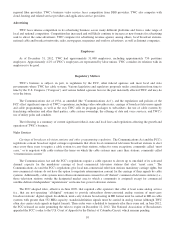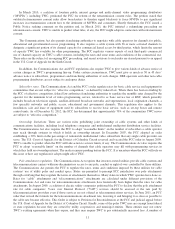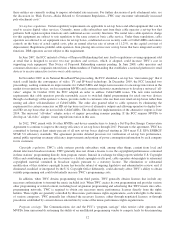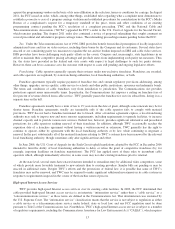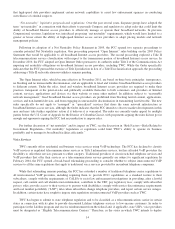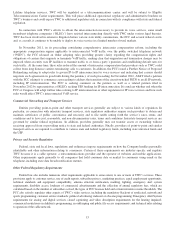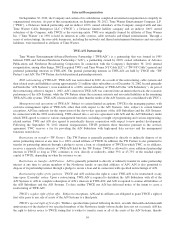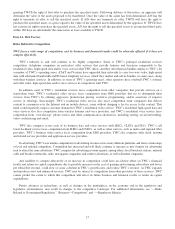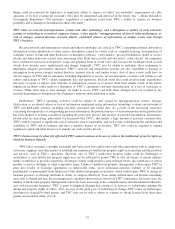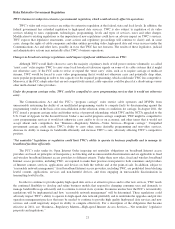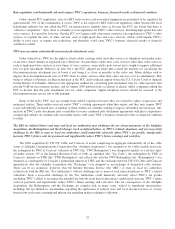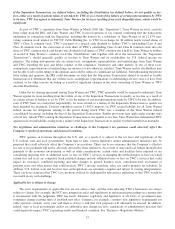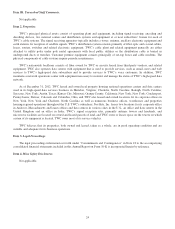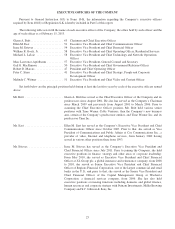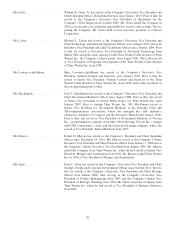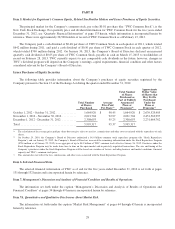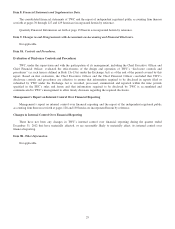Time Warner Cable 2012 Annual Report Download - page 30
Download and view the complete annual report
Please find page 30 of the 2012 Time Warner Cable annual report below. You can navigate through the pages in the report by either clicking on the pages listed below, or by using the keyword search tool below to find specific information within the annual report.The accounting treatment of goodwill and other identified intangibles could result in future asset impairments, which
would be recorded as operating losses.
Authoritative guidance issued by the Financial Accounting Standards Board (“FASB”) requires that goodwill, including
the goodwill included in the carrying value of investments accounted for using the equity method of accounting, and other
intangible assets deemed to have indefinite useful lives, such as cable franchise rights, cease to be amortized. The guidance
requires that goodwill and certain intangible assets be tested annually for impairment or upon the occurrence of a triggering
event. Under the accounting rules, the Company may elect to perform a qualitative assessment to determine if an impairment
is more likely than not to have occurred. If an impairment is more likely than not to have occurred, a quantitative assessment
is required. If the quantitative assessment determines that the carrying value of goodwill or a certain intangible asset exceeds
its estimated fair value, an impairment charge is recognized in an amount equal to that excess. Any such impairment is
required to be recorded as a noncash operating loss.
TWC’s 2012 annual impairment analysis, which was a qualitative assessment performed as of July 1, 2012, did not
result in any goodwill or cable franchise rights impairment charges. However, it is possible that impairment charges may be
recorded in the future to reflect potential declines in fair value. See “Management’s Discussion and Analysis of Results of
Operations and Financial Condition—Critical Accounting Policies and Estimates—Fair Value Estimates—Indefinite-lived
Intangible Assets and Goodwill.”
TWC has incurred substantial debt, which may limit its flexibility and prevent it from taking advantage of business
opportunities.
As of December 31, 2012, TWC had $23.535 billion of net debt and mandatorily redeemable preferred equity. This
level of indebtedness may limit TWC’s ability to respond to market conditions, provide for capital investment needs or take
advantage of business opportunities. In addition, TWC’s borrowing costs may be affected by debt ratings assigned by
independent ratings agencies that are based, in significant part, on TWC’s leverage and its performance as measured by
customary credit metrics. A decrease in these ratings would likely increase TWC’s cost of borrowing and make it more
difficult for TWC to obtain financing.
Risks Related to Dependence on Third Parties
Increases in programming and retransmission costs or the inability to obtain popular programming could adversely affect
TWC’s operations, business or financial results.
Video programming and retransmission costs represent a major component of TWC’s expenses and are expected to
continue to do so primarily due to the increasing cost of obtaining desirable programming, particularly broadcast and sports
programming. TWC’s video programming costs as a percentage of video revenue have increased over recent years and will
continue to increase over the next coming years as cable programming and broadcast station retransmission consent cost
increases outpace growth in video revenue. Furthermore, providers of desirable content may be unwilling to enter into
distribution arrangements with TWC on acceptable terms and owners of non-broadcast video programming content may
enter into exclusive distribution arrangements with TWC’s competitors. TWC’s failure to carry programming that is
attractive to TWC’s subscribers could adversely impact revenue.
TWC may not be able to obtain necessary hardware, software and operational support.
TWC depends on third-party suppliers and licensors to supply some of the hardware, software and operational support
necessary to provide some of TWC’s services. Some of these vendors represent TWC’s sole source of supply or have, either
through contract or as a result of intellectual property rights, a position of some exclusivity. If demand exceeds these
vendors’ capacity, they experience operating or financial difficulties, they significantly increase the amount TWC pays for
necessary products or services, or they cease production of any necessary product due to lack of demand, profitability, being
acquired by another company or otherwise, TWC’s ability to provide some services may be materially adversely affected.
Any of these events could materially and adversely affect TWC’s ability to retain and attract subscribers and have a material
negative impact on TWC’s operations, business, financial results and financial condition.
20


